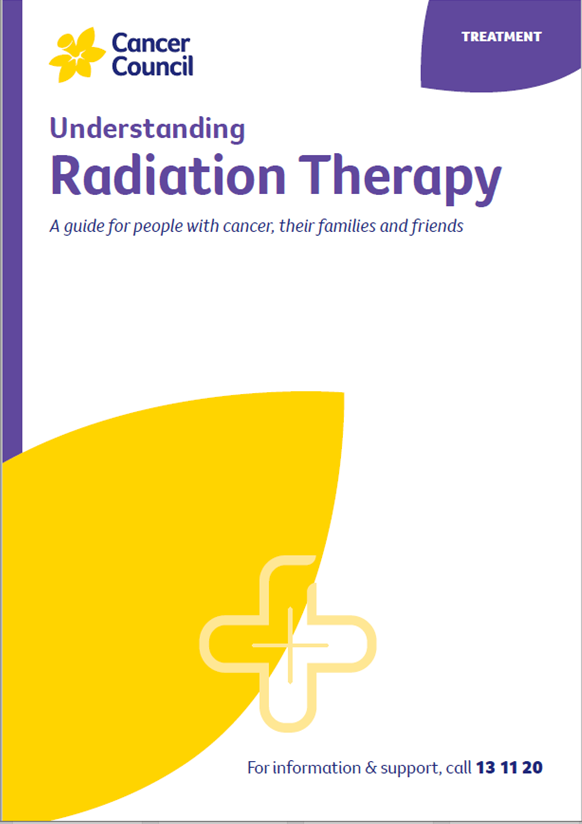- Home
- Bowel cancer
- Treatment for early bowel cancer
- Radiation therapy
Radiation therapy for bowel cancer
Also known as radiotherapy, radiation therapy uses a controlled dose of radiation to kill or damage cancer cells so they cannot grow, multiply or spread. Radiation therapy may be given on its own or in combination with chemotherapy (chemoradiation). The chemotherapy makes cancer cells more sensitive to radiation.
Learn more about:
- When radiation therapy is given
- Having radiation therapy
- Side effects of radiation therapy
- How radiation therapy affects sexual function and fertility
- Video: What is radiation therapy?
- Podcast: Making Treatment Decisions
When radiation therapy is given
Radiation therapy may be recommended for rectal cancer but is rarely used to treat colon cancer. You may have radiation therapy at the following times.
Before surgery (neoadjuvant)
Radiation therapy is used before surgery to shrink the tumour. This makes it easier for the surgeon to completely remove the cancer and also reduces the risk of the cancer coming back.
After surgery (adjuvant)
Occasionally, if the rectal cancer is found to be more advanced than originally thought, radiation therapy may be used after surgery to destroy any remaining cancer cells. This only happens if radiation therapy was not given before surgery.
Having radiation therapy
External beam radiation therapy is the most common type of radiation therapy for rectal cancer. Newer technology means that treatment machines can accurately deliver a high dose to the affected area, with much lower doses going to the surrounding tissue. This helps to reduce the side effects from radiation therapy.
You will have more imaging scans to help your radiation oncologist design a treatment plan for your situation. This will include the number of sessions you’ll have and whether you will also have chemotherapy.
Before treatment, some small marks like a freckle may be tattooed on your skin to help pinpoint the exact area to receive the radiation. Treatment is given daily on weekdays. During treatment, you will lie on a treatment table under a machine called a linear accelerator. Each treatment takes only a few minutes, but a session may last 10–20 minutes because of the time it takes to set up the machine. The treatment is painless and can’t be seen or felt.
After finishing your neoadjuvant treatment, there will be a break before surgery. This gives time for the radiation therapy to have its full effect.
For more on this, see our general section on Radiation therapy.
Side effects of radiation therapy
Most side effects are temporary and disappear a few weeks or months after treatment. Feeling tired is a common side effect. Radiation therapy for rectal cancer is usually given over the pelvic area, which can affect your sexual function and ability to have children (fertility).
Radiation therapy can also irritate the bowel and bladder. This may mean:
- needing to pass urine (wee or pee) more often and burning when you pass urine (cystitis)
- redness and soreness in the treatment area
- faecal urgency and incontinence
- diarrhoea
- constipation
- mucus discharge or small amounts of bleeding from the anus.
Radiation therapy can cause the skin or internal tissue to become less stretchy and harden (fibrosis). It can also inflame the lining of the rectum (radiation proctitis).
People react to radiation therapy differently, so some people may have few side effects, while others have more. Your treatment team will talk to you about possible side effects and how to manage them.
For more on this, see our general section on Radiation therapy.
Radiation proctitis
Radiation to the pelvic area can affect the lining of the rectum, causing inflammation and swelling (known as radiation proctitis). This can lead to a range of side effects including diarrhoea and bleeding from the rectum, the need to empty the bowels urgently, and loss of control over the bowels (faecal incontinence).
These side effects may appear shortly after radiation therapy for rectal cancer, but are generally not an ongoing problem because the rectum is removed during surgery.
Your treatment team will talk to you about the risk of developing radiation proctitis and ways to cope with bowel changes.
→ READ MORE: How radiation therapy affects sexual function and fertility
Video: What is radiation therapy?
Watch this short video to learn more about radiation therapy.
Podcast: Making Treatment Decisions
Listen to more episodes from our podcast for people affected by cancer
More resources
A/Prof David A Clark, Senior Colorectal Surgeon, Royal Brisbane and Women’s Hospital, QLD, The University of Queensland and The University of Sydney; Yvette Adams, Consumer; Dr Cameron Bell, Gastroenterologist, Royal North Shore Hospital, NSW; Katie Benton, Advanced Dietitian Cancer Care, Sunshine Coast University Hospital and Queensland Health, QLD; John Clements, Consumer; Dr Fiona Day, Medical Oncologist, Calvary Mater Newcastle, NSW; Alana Fitzgibbon, Clinical Nurse Consultant, GastroIntestinal Cancers, Cancer Services, Royal Hobart Hospital, TAS; Prof Alexander Heriot, Consultant Colorectal Surgeon, Director Cancer Surgery, Peter MacCallum Cancer Centre, and Director, Lower GI Tumour Stream, Victorian Comprehensive Cancer Centre, VIC; Caitriona Nienaber, 13 11 20 Consultant, Cancer Council WA; Dr Kirsten van Gysen, Radiation Oncologist, Nepean Cancer Care Centre, NSW.
View the Cancer Council NSW editorial policy.
View all publications or call 13 11 20 for free printed copies.

